
i ' l .
0 l i .
Cauten, Tolten, and Bueno ? The Cauten, or Imperial, is
spoken of hy the earlier writers on Chile, as admitting ships
of burthen; but now the entrance of each of those rivers is
almost closed by a bar.
In opposition to this idea it may be urged, that where a large
river runs into the sea exactly against the direction of the prevailing
wind and swell, a bar of sand, shingle, and mud must be
formed by deposition from tbe opposing waters; and that it is
only where a river runs uninterruptedly into the sea, protected
from wind and swell by a projecting islet or point of land, that
a perfectly clear entrance may be expected; and, therefore,
that the Spanish accounts must have been incorrect. I suspect
that they described those rivers as they found them at some distance
in-land, not at the mouth.
Leaving the hospitable colonel assembling a remarkably awkward
squad, whom he was anxiously preparing for the threatened
attack of the ‘ Boroanos,’ we rode away upon the good
horses which, three days previously, had brought us from Concepcion.
At the Carampangue there was no balsa. What was to be
done .? To wait until some one brought a boat from the opposite
shore might expend the day ; but the river was wide and
deep, and the weather too cold for so long a swim ; nevertheless,
five dollars excited our guide, or rather horse-keeper, to
make the trial, and during several minutes 1 thought he must
have been drowned : for, instead of slipping off the horse, and
holding by the mane or tail when he began to swim, the man
sat bolt upright, so that the poor horse’s head was scarcely
visible; and both horse and man appeared to get confused,
turning round in the stream two or three times, while the current
was carrying them down the river. At last they struggled
out, to my infinite joy, and galloped off in search of the men
whose business it was to attend at the ferry with a balsa. While
we were anxiously waiting, a large party appeared on the opposite
bank, with whom were the balsa-men. They had been merrymaking,
the previous day having been the feast of St. John;
and as they had hardly recovered from the effects of ‘ chicha,’
and other favourite libations, to carry so large a number across
upon a small raft, was a difficult undertaking. Talking at the
pitch of their voices, laughing and tumbling about, their
reaching the opposite shore without a cold-bath, was attributed
by Vogelborg to the protection of the saint whose anniversary
they had so dutifully celebrated. The ‘ chicha,’* is sometimes
fermented, and then soon affects a person’s head, if drank
to excess : but these votaries of St. John had doubtless improved
its insipid taste by aguardiente. During the chicha
season, or autumn, the Indians are said to be more dangerous
than at other times, as' they indulge in this, their favourite
beverage, to excess.
Apple trees are now abundant in southern Chile, throughout
the Indian as well as Spanish territories. They were also plentiful
on the eastern side of the Andes, particularly about the river
Negro and the great lake ‘ Nahuelhuapi,’ in the middle of the
last century. Whether they are indigenous, or were planted by
the early missionaries, has been much disputed in that country;
but as the Indian name for them is ‘ manchana,’# I should
incline to think they were introduced by the first missionaries.
Our road over the heights of Villagran was much worse than
at our former passage. Heavy rain and constant traffic, in consequence
of the wreck, had worn it into a curious succession
of steps : and each animal endeavouring to place his feet in
the holes made by those which had previously passed—the
rain having filled up the hollows with mud and water—had
worked the clayey track into a continuation of transverse ridges
and trenches. A man might step from ridge to ridge without
wetting his feet; but the horses always planted their
legs, up to the knees and hocks, in the mud and water of the
trenches. Their motion was just as if they were stepping
over logs of timber : unpleasant enough for the rider, and extremely
tiring to themselves. We helped them however as much
as possible, to the surprise of our lazy guide, by dismounting
and leading them up the hills as well as down.
* ‘ Chicha’ is made with maize, apples, or other thing’s.
t Manzana is Spanish for apple,
S h 2;
iI ^' '4 *-
I ’*'1 : \ I U.
Mi'